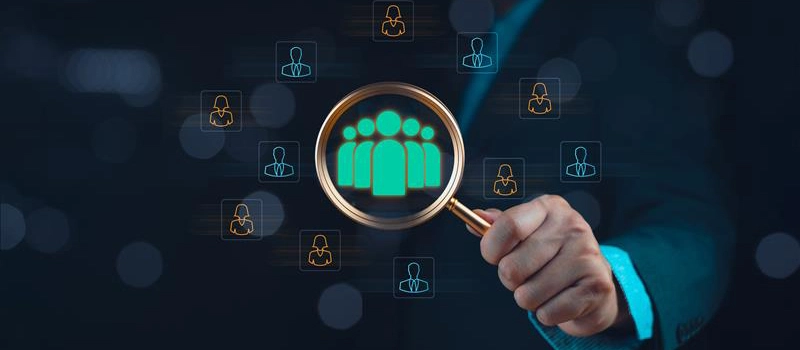How AI is changing the future of enterprise talent acquisition?

The landscape of enterprise talent acquisition is rapidly evolving, with artificial intelligence (AI) at the forefront of this transformation. As organizations seek to stay competitive, the integration of AI in talent acquisition strategies has gained prominence.
According to a 2023 study by Aptitude Research, 60% of companies have increased their investment in automation technologies over the past year. AI recruitment technology is not just a trend but a strategic asset that modernizes the hiring process, enhances efficiency, and improves candidate matching. By leveraging AI, enterprises can streamline their recruitment processes, reduce biases, and make data-driven hiring decisions, ultimately giving them a competitive edge in attracting top talent.
The role of AI in modern talent acquisition
As enterprises continue to innovate, AI has gained significance in modern talent acquisition, transforming traditional recruitment processes into adaptive, dynamic and efficient systems. AI technologies, such as machine learning, natural language processing, and predictive analytics are revolutionizing how organizations identify, evaluate, and hire candidates.
Integration of AI technologies
Machine learning algorithms can analyze vast amounts of data to identify patterns and predict candidate success. Natural language processing (NLP) enables AI to understand and interpret human language, enhancing the capability to screen resumes and assess candidates’ skills accurately. Predictive analytics provide insights into candidate behaviors and future performance, helping recruiters make more informed decisions.
Enhancing efficiency and effectiveness
AI in talent acquisition automates time-consuming tasks such as resume screening and initial candidate assessments. This automation not only speeds up the recruitment process but also ensures a more consistent and objective evaluation of applicants. In a nutshell, enterprises can focus on strategic talent acquisition activities, such as engaging with top candidates and refining their talent acquisition strategies.
Additionally, incorporating AI into talent acquisition processes improves candidate experience by providing timely and personalized communication. Furthermore, AI-powered chatbots can answer candidates’ queries, schedule interviews, and provide feedback, enhancing the overall recruitment journey.
Key benefits of using AI in recruitment
AI recruitment solutions offer numerous advantages that significantly enhance the talent acquisition process for large enterprises. These benefits range from improved candidate matching to fostering diversity and inclusion within the hiring process. Let’s explore the benefits of using AI in recruitment.
Improved candidate match accuracy
AI-driven recruitment tools leverage data-driven insights to match candidates with job openings more accurately. It can analyze a vast array of data points, such as skills, experiences, and even social media activity, to predict which candidates are likely to succeed in a given role.
Leoforce by Leoforce uses seven multidimensional data points and hundreds of attributes to score and rank candidates. This results in better hiring outcomes and reduces the likelihood of mismatched hires.
Increased efficiency in processing applications
AI significantly speeds up the recruitment process by automating repetitive tasks like resume screening and initial candidate assessments. This not only saves time for HR professionals but also allows them to focus on more strategic activities, such as engaging with top candidates and refining talent acquisition strategies. Leoforce’s advanced auto search, match, and talent insights enable recruiters to source, score, and rank candidates in less than 5 minutes.
Reduction of biases in hiring
One of the most significant advantages of AI in recruitment is its potential to reduce biases. Traditional hiring processes can be influenced by unconscious biases, leading to less diverse hiring practices. AI systems, when properly designed and implemented, can help mitigate these biases by focusing solely on candidates’ qualifications and experiences. Leoforce by Leoforce offers a built-in DE&I filter that can result in more equitable hiring practices and supports DEI (diversity, equity, and inclusion) initiatives within enterprises.
Enhanced candidate experience
AI-powered tools, such as chatbots and automated interview schedulers, enhance the candidate experience by providing timely and personalized communication. Candidates receive instant responses to their inquiries, feedback on their application status, and seamless scheduling of interviews. This improved experience can positively impact the employer brand, making the company more attractive to top talent.
Data-driven decision making
AI recruitment solutions provide HR professionals with valuable insights through talent acquisition data analytics. These insights can inform strategic decisions, such as identifying skill gaps within the organization, forecasting future hiring needs, and optimizing recruitment marketing strategies. The ability to make data-driven decisions ensures that enterprises remain agile and responsive to changing market conditions.
How other enterprises are incorporating AI in recruiting
The successful integration of AI in recruitment processes can be illustrated through real-world examples of enterprises that have adopted AI tools to enhance their talent acquisition strategies. These case studies highlight the practical applications and tangible benefits of AI in recruitment.
Case study 1: Electrolux
Electrolux, a global leader in household appliances, has significantly enhanced its recruitment process by integrating AI technology. Partnering with assessment firms, Electrolux uses AI to analyze video interviews, assessing candidates’ facial expressions, body language, and word choice against traits predictive of job success. This innovative approach is designed to meet the real needs of consumers and professionals by focusing on thoughtfully designed innovations based on extensive consumer insight.
Since implementing the AI-powered platform, Electrolux has experienced an 84% increase in application conversion rates, a 51% decrease in incomplete applications, and a 9% reduction in time to hire. Additionally, the use of one-way interviews has saved 20% of recruitment time, and AI scheduling has resulted in a 78% time savings. This comprehensive AI solution has streamlined Electrolux’s hiring process, making it more efficient and effective.
Case study 2: Hilton Hotels
Hilton, a leading hospitality company, faced significant recruitment challenges due to the high turnover rate in the industry. To address this, Hilton adopted AI recruiting tools to streamline its hiring process. The AI software analyzed personal candidate information and related data, resulting in a 40% improvement in hiring rates.
Most impressively, Hilton saw a 90% reduction in vacant position replacement times. AI-powered chatbots were deployed to handle initial candidate interactions, answer frequently asked questions and schedule interviews. This not only enhanced the candidate experience but also freed up recruiters to focus on more complex tasks, leading to a significant reduction in the time-to-hire and an increase in candidate satisfaction.
Case study 3: Parsons
Parsons Corporation, a leader in national security solutions, faced significant challenges in sourcing high-quality talent within a niche, competitive industry. With a limited candidate pool and intense competition, it could take up to a year to hire just one specialized candidate. To address these issues, Parsons integrated Leoforce, an AI recruiting tool, which leveraged multi-channel search capabilities and Artificial Intuition technology to streamline the hiring process.
The results were impressive: sourcing time was cut in half, and Parsons hired their first niche candidate in only one week. Leoforce provided access to over 70 candidate sources and a proprietary database of 850+ million candidates, enabling Parsons to find and engage high-quality candidates much faster than before. This integration significantly improved Parsons’ recruitment efficiency and effectiveness, allowing them to stay ahead of the competition.
Developing an AI-enhanced talent acquisition strategy
Integrating AI into existing talent acquisition strategies can significantly improve the efficiency and effectiveness of the recruitment process. Here’s how enterprises can develop an AI-enhanced talent acquisition strategy:
Align AI tools with business objectives
The first step is to ensure that the AI tools chosen align with the company’s overall business objectives. This involves understanding the specific recruitment challenges the organization faces and selecting AI technologies that can address these issues. For example, if the goal is to reduce time-to-hire, AI tools that automate resume screening and initial candidate assessments would be beneficial.
Select the right AI technologies
There are various AI technologies available, each with unique features and capabilities. Enterprises should evaluate different AI recruiting tools to find those that best meet their needs. Key considerations include the tool’s ability to integrate with existing HR systems, its user-friendliness, and the specific functions it offers, such as predictive analytics, natural language processing, or automated scheduling.
Train HR teams to use AI tools effectively
Successful integration of AI in talent acquisition requires HR teams to be well-versed in using these new tools. Providing comprehensive training to HR staff ensures they can effectively leverage AI technologies. This includes understanding how to interpret data insights generated by AI, how to oversee AI-driven processes, and how to troubleshoot any issues that may arise.
Address potential challenges
While AI offers numerous benefits, it also presents challenges that need to be managed. Technical issues, such as data integration and system compatibility, can arise during implementation. Ethical and legal considerations, such as data privacy and the need for transparent AI processes, must be addressed to avoid potential pitfalls. Additionally, it’s crucial to mitigate any unintended biases in AI algorithms to ensure fair and equitable hiring practices.
Monitor and adapt
Once AI tools are implemented, continuous monitoring and adaptation are essential. Enterprises should regularly review the performance of AI technologies and make adjustments as needed to optimize their impact. This might involve updating algorithms, refining data inputs, or integrating new AI capabilities as they become available.
Challenges and considerations in adopting AI for talent acquisition
Implementing AI in talent acquisition comes with its own set of challenges and considerations that organizations need to address:
Technical challenges
Integrating AI systems with existing HR infrastructure can be complex and require significant resources. Ensuring seamless data integration, system compatibility, and cybersecurity measures are essential to the successful implementation of AI tools.
Ethical and legal considerations
Organizations must adhere to data privacy regulations and ensure transparency in their AI processes. Additionally, mitigating bias in AI algorithms to ensure fair and unbiased hiring practices is crucial.
Failure to address ethical and legal concerns can lead to reputational damage and legal liabilities. A notable example is the case of Amazon’s AI recruiting tool which was found to be favoring male candidates for technical roles. Similarly, iTutor, a group providing remote tutoring services to students in China, used AI-powered recruiting software that automatically rejected female applicants ages 55 and older, and male applicants ages 60 and older.
This discriminatory practice raised significant ethical and legal concerns, highlighting the importance of thorough testing and monitoring of AI algorithms to prevent biased outcomes and ensure fair treatment of all applicants.
Change management
Introducing AI into the talent acquisition process often requires a cultural shift within the organization. HR teams and hiring managers may be resistant to change or feel apprehensive about relying on AI for critical hiring decisions. Effective change management strategies, including communication, training, and stakeholder engagement, are essential to overcome resistance and foster adoption.
Data quality and bias mitigation
The effectiveness of AI in talent acquisition relies heavily on the quality of data used to train AI algorithms. Poor-quality data can lead to inaccurate predictions and reinforce biases in hiring decisions. Organizations must ensure data accuracy, completeness, and relevance to minimize the risk of biased outcomes.
Cost and resource allocation
Implementing AI in talent acquisition requires significant financial investment and resource allocation. Organizations need to consider the costs associated with acquiring AI technologies, training HR staff, and maintaining AI systems. Budget constraints and competing priorities may pose challenges to organizations, particularly small and medium-sized enterprises.
Integration with human expertise
While AI can streamline many aspects of the talent acquisition process, it is not a substitute for human expertise. Human judgment, intuition, and emotional intelligence play crucial roles in assessing candidates’ fit and cultural alignment. Finding the right balance between AI-driven automation and human involvement is essential to optimize hiring outcomes.
Scalability and long-term sustainability
As organizations grow and evolve, their talent acquisition needs change. AI solutions must be scalable and adaptable to accommodate future growth and changes in recruitment strategies. Ensuring the long-term sustainability of AI initiatives requires ongoing evaluation, optimization, and alignment with organizational goals.
Future trends in AI and talent acquisition
As technology continues to advance, the future of talent acquisition will undoubtedly be shaped by emerging trends in artificial intelligence. Let’s explore some potential developments and their implications for recruitment strategies:
Deep learning and advanced analytics
One of the most significant future trends in AI for talent acquisition is the continued advancement of deep learning algorithms and advanced analytics. These technologies enable AI systems to analyze vast amounts of data with unprecedented accuracy and efficiency. Recruiters can gain deeper insights into candidate profiles, preferences, and behaviors, allowing for better targeted and personalized recruitment strategies.
Predictive modeling
Another emerging trend is the use of predictive modeling in talent acquisition. By analyzing historical data and patterns, AI algorithms can predict future hiring needs, identify potential talent gaps, and even forecast candidate performance and retention rates. Predictive modeling enables organizations to take a proactive approach to talent acquisition, ensuring they have the right people in place to drive business success.
Natural language processing (NLP)
NLP technologies enable AI systems to understand and interpret human language, making it easier to automate various aspects of the recruitment process, such as resume screening, candidate engagement, and interview scheduling. Recruiters can streamline workflows, improve communication with candidates, and enhance the overall candidate experience.
Augmented reality (AR) and virtual reality (VR)
AR and virtual reality VR technologies have the potential to transform how organizations attract and assess talent. Recruiters can easily create immersive virtual environments and provide candidates with realistic job previews, simulate work scenarios, and assess skills in real-time.
Ethical AI practices
As AI continues to play a more significant role in talent acquisition, ensuring ethical AI practices will be critical. Organizations must prioritize fairness, transparency, and accountability in their AI-driven recruitment processes to avoid biases and discrimination.
Preparing for the future
In light of the evolving landscape of AI in recruitment, it’s crucial for enterprises to stay proactive and adapt to advancements in technology. Here are some recommendations to help organizations prepare for the future:
Continuous learning and upskilling
Investing in continuous learning and upskilling initiatives is essential for HR professionals to stay abreast of emerging trends and technologies in talent acquisition. Providing training programs on AI tools and techniques can help HR teams effectively leverage AI in recruitment processes and stay competitive in the job market.
Innovation and experimentation
Encouraging a culture of innovation and experimentation within the organization can foster creativity and drive the adoption of new AI-driven recruitment technologies. Establishing dedicated innovation labs or cross-functional teams can facilitate the exploration of innovative solutions and pilot projects to test the feasibility and effectiveness of AI tools in talent acquisition.
Technology adoption and integration
Embracing technology adoption and integrating AI solutions into existing recruitment processes is key to staying competitive in the digital age. Organizations should invest in AI-powered recruitment platforms and tools that align with their talent acquisition strategies and business objectives. Seamless integration with existing HR systems and workflows is essential to maximize the benefits of AI in recruitment.
Data-driven decision-making
Harnessing the power of data analytics and insights is critical for making informed recruitment decisions. Data-driven decision-making enables HR teams to optimize recruitment strategies, improve candidate experiences, and drive better business results.
Partnerships and collaborations
Collaborating with technology partners, AI vendors, and industry experts can provide valuable expertise and resources to support AI adoption in recruitment. Building strategic partnerships can help organizations access cutting-edge AI technologies, stay ahead of industry trends, and leverage best practices in talent acquisition.
Agility and adaptability
Lastly, maintaining agility and adaptability is crucial for navigating the rapidly evolving landscape of AI in recruitment. Organizations should be open to experimenting with new technologies, iterating on recruitment processes, and adapting to changing market dynamics.
In conclusion, the transformative potential of AI in enhancing enterprise talent acquisition is undeniable. From streamlining recruitment processes to improving candidate experiences, AI technologies offer unprecedented opportunities for organizations to gain a competitive edge in attracting and retaining top talent. As we look to the future, proactive adoption and ongoing adaptation to new technologies will be key to staying competitive in the dynamic landscape of talent acquisition.
Meet Leoforce
Leoforce revolutionizes the talent sourcing process by automating sourcing from over 80 channels, delivering a deduplicated candidate list in less than 5 minutes. This consolidation of multi-channel sourcing saves each recruiter up to 12 hours per job, streamlining workflow and increasing efficiency.
Additionally, Leoforce significantly enhances candidate quality, with up to a 70% increase in quality through rapid matching of candidates to the most suitable positions. Furthermore, Leoforce helps organizations reduce sourcing costs by up to 50% by automating and streamlining recruiting processes, optimizing resource allocation, and improving return on investment.
Find out how Leoforce by Leoforce can help with your organization’s recruiting needs. Request a demo.


